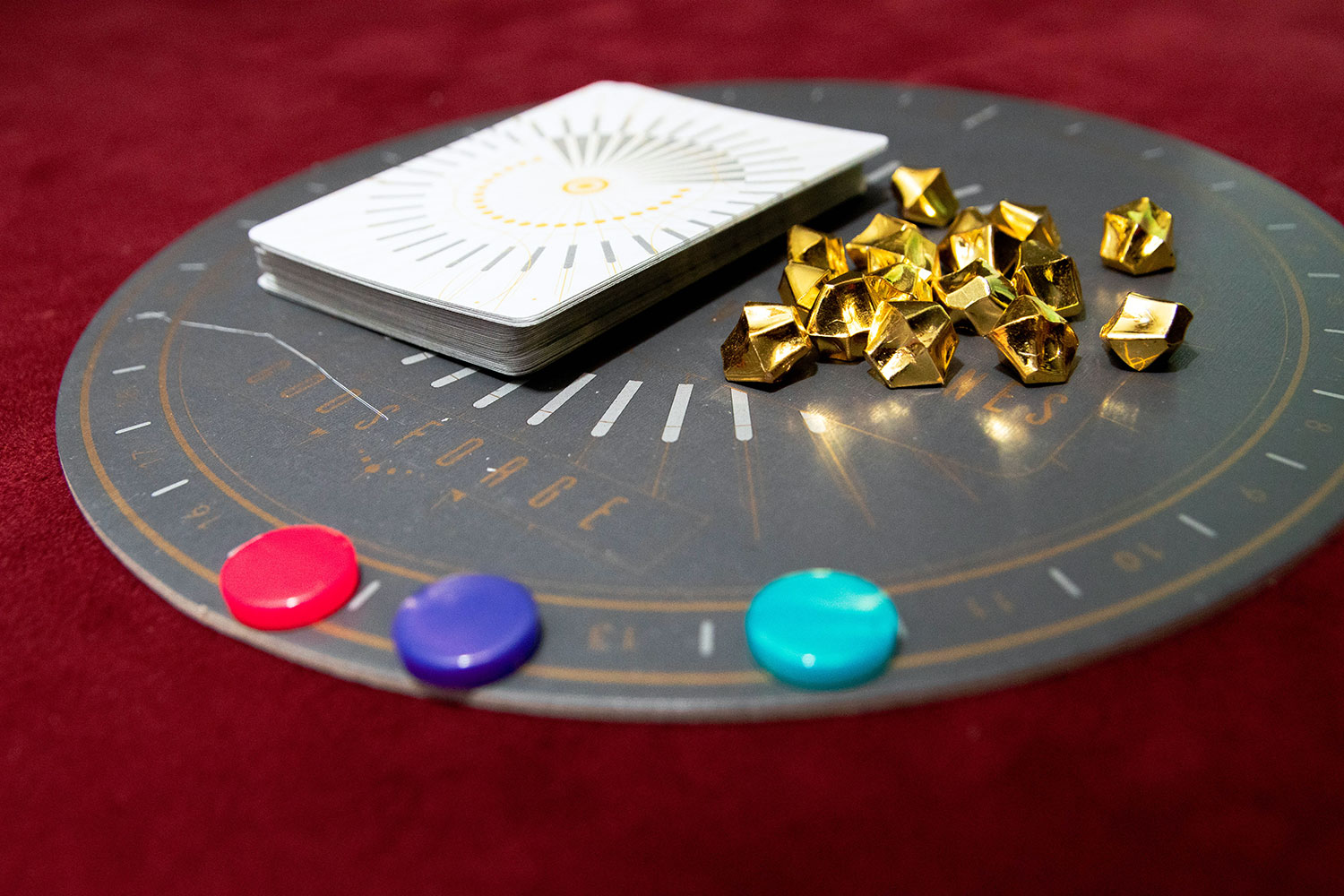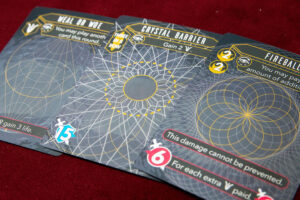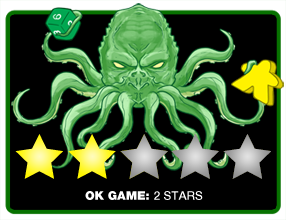 If you’ve spent time in the BGQ Discord (which you definitely should) you’ll know there is an ongoing debate about what exactly is a dueling game. And what is a skirmish game? And all other kinds of inane conversations about definitions of things.
If you’ve spent time in the BGQ Discord (which you definitely should) you’ll know there is an ongoing debate about what exactly is a dueling game. And what is a skirmish game? And all other kinds of inane conversations about definitions of things.
Godsforge is here to present another conundrum. I was drawn to this game initially by the amazing cover with the intricate artwork and metallic-y gold accents. And then I found out it is a dueling game which is always something I want to check out. But is it?
Gameplay Overview:
Godsforge gameplay is incredibly straightforward. Each round will have four phases:
- Upkeep – Discard up to two cards and then draw cards until you reach your hand limit (which is 4 by default).
- Forge Roll – Roll your four dice. Reroll 1 die twice or 2 dice once. Choose a single card to play.
- Reveal – All players reveal their played card. Some may have an effect when revealed.
- Attack – Sum all the attack from your cards. Deal that much damage to the player on your left (reduced by any protection they have).

The cards you can play come in two varieties. Creations that will stay from round to round and spells that are powerful one-time effects. Each card requires you have a certain combination of dice to play it. Generally, these will be specific numbers or something like “three in a row” or “two odd”. Luckily, if you roll a 1 it is wild and can be used as any number. You will also collect veilstones (which take the form of shiny gold nuggets) throughout the game which can be used to increase or decrease a die’s value.
You can only play a single card and if you can’t play any card, or don’t want to for some reason, you can take four veilstones instead. Once a player’s health is reduced to 0 they are eliminated. Play continues until only one player is left. However, in every round after any player is eliminated all attack phases get 7 extra damage to insure it comes to an end fairly promptly.

Game Experience:
As a rule, I’m a fan of dueling games like Magic: The Gathering, Monolith Arena, and Dice Throne. They are all very high up on my list of good games. One thing they all have in common though is that they are really 2 player games. Sure, there are rules for multiplayer. And you MTG Commander aficionados are for sure going to come at me in the comments. But frankly, I think they kind of stink with more than two players. It adds either negotiation into the game or random targeting and generally slows things down.
Godsforge feels very much like a dueling game but handles multiplayer much more seamlessly. You attack to your left and defend from your right. And since everyone reveals their card for the turn simultaneously there is little you can really do to react across the table. So if you’ve got 3-4 players and want to duel… Godsforge has you covered.

But… What if you also want to feel like you are playing a dueling game where you, as a player, have more than a token amount of agency in what happens? Well… bad news. This ain’t it.
You have four cards in your hand. You roll four dice which will limit which of those four you can play. Now you may have some ways to manipulate the dice and generally speaking it’s pretty easy to match at least something in your hand. Maybe you have to re-roll or use some veilstones but after your first roll you’ll probably know what card you are trying to play.
Then you reveal. And you attack and get attacked. It’s dead simple. And that isn’t necessarily bad. But as a fan of dueling games that normally comes from diving into strategy and tactics and knowing what your opponents may be trying to do to you and thinking about ways to prevent it. Maybe you have a plan and a plan B and, for dire occasions, a plan C. In Godsforge you just… play a card and then count up how much damage is coming your way.

Now maybe your opponent is piling on damage early. So you really need some creations that prevent damage. Or maybe a spell to kill a creation of theirs that is causing you problems. Unfortunately, the game lacks any real way to dig through the cards to give you a fighting chance. Maybe you’ll draw it. If you don’t, you can discard up to two cards during upkeep and draw more, hoping to find it. But you are giving up a lot of the strategy to lady luck.
I will note that I really like the card art on the creations. It seems to be a conglomeration of all things fantasy but the art style really works for me. The spells, unfortunately, are basically art-less. I’m not sure if that was a stylistic choice, cost-saving measure, or both. It’s nice that they are easy to tell apart but it’s a shame they don’t look more thematic. Not that the theme in this game comes through much anyway. The rule book spends a lot of time telling you which die values match which elements, but it’s a lot of fluff that you won’t likely care about. When you need to roll a 2 to play the card you want you’ll probably be thinking “I hope I get a 2,” rather than “I hope I roll the air element.”
Final Thoughts:
It’s not that Godsforge is bad. But it’s really not what the game advertised to be. It feels more like a racing game than a dueling game. You play cards that move your opponent’s life total backwards and hope it gets to 0 before yours does. There aren’t creations that really provide tactical advantages. There isn’t any positioning or countering your opponents. And there isn’t much ability to dig for answers if you find yourself behind. Godsforge is more of a duel that you are watching than participating in.
Final Score: 2 Stars – Some good art and it handles multiplayer fairly well, but players just don’t have enough influence on these magical battles.
 Hits:
Hits:
• Simultaneous revealing makes it work just as well with more than 2 players.
• Really dig the art on the creations cards.
Misses:
• Lack of interesting choices.
• Card draw, dice rolling lead to a lot of luck. And very few ways to manipulate your hand of cards.






















